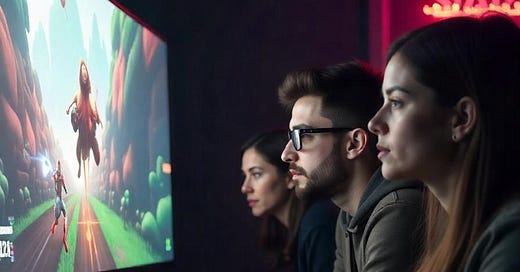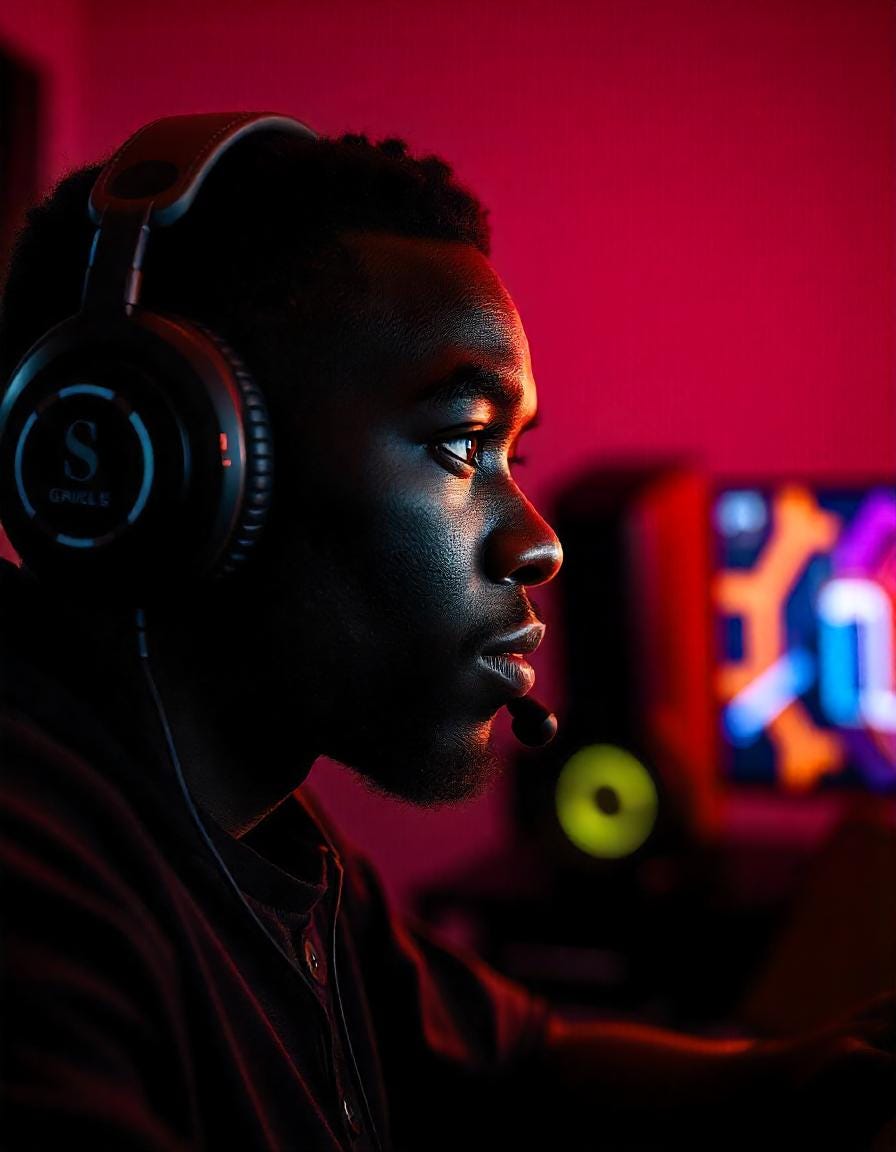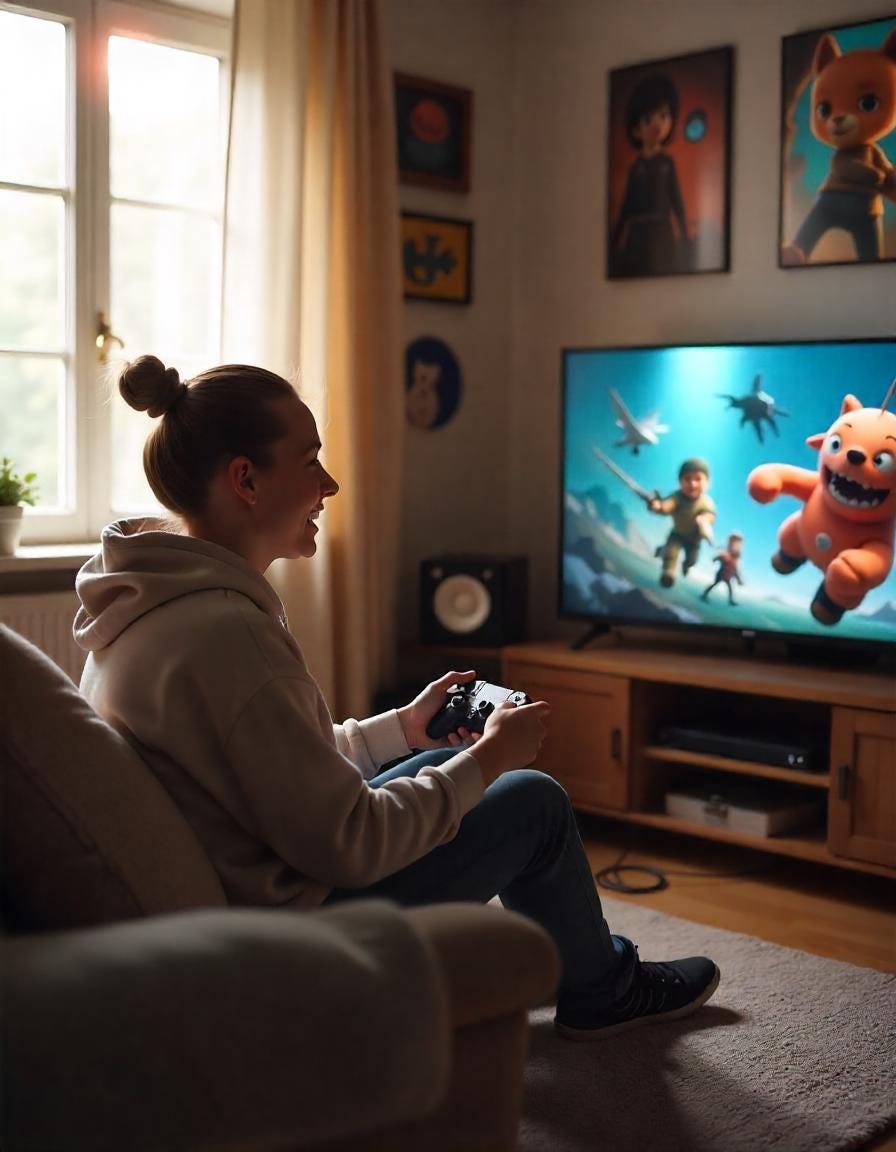Short Dive: The Underrated Power of Video Games: Unlocking Mental Health Benefits Through Play
How Video Games Are Shaping Mental Health, Creativity, and Social Connection in the Digital Age
Overview
Welcome to the first entry in my newsletter series exploring the intricate relationship between video games and mental health. In this entry, I will shine a spotlight on the positive side of gaming—a side that is often overlooked or misunderstood. From helping players manage stress and anxiety to fostering creativity, social connection, and emotional resilience, video games are proving to be much more than mere entertainment. With research and global insights, I will delve into how gaming can serve as a powerful tool for mental well-being, providing players with an outlet to heal, grow, and connect in meaningful ways.
Video games, as discussed in this issue, can reduce loneliness, boost cognitive abilities, and even act as therapeutic tools in clinical settings. Whether it’s solving puzzles in Portal 2, creating safe spaces in Minecraft, or finding a sense of community in Fortnite, the potential of gaming to positively impact mental health is immense. I’ve also highlighted how games are being used in therapeutic practices to treat anxiety, depression, and even to foster emotional regulation, offering innovative and stigma-free solutions for those who need them.
However, like any powerful tool, balance is key. While the benefits of gaming are clear, it’s equally important to acknowledge its potential downsides, especially when it is overused. That’s why my next edition will take a deep dive into the effects of excessive gaming. I’ll explore the fine line between healthy gaming habits and the risks of overindulgence, including its impact on sleep, social relationships, and mental well-being.
As this series progresses, I aim to provide a comprehensive view of video games’ place in our lives—celebrating their benefits while addressing their challenges. Stay tuned for the next entry as I continue to uncover the full spectrum of how gaming shapes our minds and our world.
Introduction: The Underrated Power of Video Games
In today’s fast-paced digital age, video games have evolved from a niche pastime into a cornerstone of global culture, shaping the way billions of people engage with technology, storytelling, and, most intriguingly, their mental health. Their sophisticated graphics, interactive narratives, and compelling storylines offer more than just entertainment—they have the potential to impact mental health positively. No longer confined to the realm of pure entertainment, video games have become immersive experiences that inspire creativity, foster social connection, and even offer relief from stress, anxiety, and depression. As conversations about mental well-being grow louder, it’s crucial to recognize video games as unconventional mediums that might be helping individuals cope, communicate, and connect. Often dismissed as distractions or vilified as sources of addiction, video games hold an untapped potential to help players cope with the challenges of modern life. Backed by a growing body of research and global reports, they are emerging as tools that can empower individuals to connect, heal, and thrive. Whether it’s the joy of overcoming a challenge in Portal 2, the creative freedom of building worlds in Minecraft, or the camaraderie of teaming up in Fortnite, video games are proving themselves to be more than just entertainment. They are a medium for growth, resilience, and connection—when used wisely. Let’s explore the research that’s transforming how we perceive gaming, and uncover how it’s making a positive impact on mental health worldwide
.
Gaming as a Stress Reliever and Cognitive Booster
The idea of video games as mindless escapism is being challenged by compelling data that paints a very different picture. According to the Power of Play report, a global study surveying nearly 13,000 players across 12 countries, video games are widely recognized as powerful stress relievers. An impressive 71% of gamers said they turn to video games to unwind and reduce stress, 55% as a means to combat isolation, and 64% turn to games to help them face everyday challenges. These findings underscore the therapeutic potential of gaming in fostering resilience and mental clarity. Interestingly, this phenomenon is not restricted to any one demographic or region. European players, for instance, reported similar outcomes, with 68% using gaming as a stress outlet and 67% crediting games with helping them tackle real-world obstacles.
“At their core, video games are designed to be fun,” says Simon Little, CEO of Video Games Europe. “But they also have the power to foster connection, community and creativity, which are vital to maintaining positive mental health. Today’s “Power of Play” report, released to coincide with Mental Health Awareness Day, reminds us that, when enjoyed as part of a balanced lifestyle, the impact of video games is overwhelmingly positive and universal.”
But stress relief is only the beginning. Gaming is also a playground for the brain, boosting cognitive functions like problem-solving, creativity, and strategic thinking. Games like Civilization require players to analyze complex situations and devise long-term strategies, while open-world games like The Legend of Zelda: Breath of the Wild encourage exploration and lateral thinking. A remarkable 73% of European gamers stated that their gaming experiences had enhanced their creativity, while 68% observed improvements in cognitive function. These statistics highlight gaming as a medium that not only entertains but also enriches the mind, offering a blend of relaxation and intellectual stimulation that few other activities can match
Gaming as a Social Lifeline in an Increasingly Isolated World
Far from being a solitary or isolating activity as many adults think, gaming has become one of the most dynamic ways to connect with others in our digital world. In fact, many of today’s games are built around social interaction, fostering collaboration and teamwork in ways that traditional entertainment cannot. Games like Fortnite, World of Warcraft, and Minecraft have established themselves as virtual meeting grounds where people from all walks of life can interact, strategize, and build relationships. The Power of Play report highlights that 55% of players globally credit video games with helping them combat feelings of isolation, and it’s easy to see why. Online multiplayer games enable players to connect with both friends and strangers, often forming bonds that transcend the virtual world. For individuals grappling with social anxiety or physical limitations, video games provide a safe, low-pressure environment to engage with others. Moreover, these interactions can enhance real-world social skills. Role-playing games (RPGs) like Final Fantasy or Pokémon encourage players to work together toward shared goals, fostering a sense of camaraderie and mutual respect. Beyond mere interaction, these experiences help players build emotional intelligence, offering a space to practice teamwork, empathy, and communication. Yet, it’s not just about forming connections; it’s about reducing loneliness. For individuals who may struggle to maintain in-person social relationships, gaming offers a unique and accessible avenue to feel seen, heard, and valued. In an era where social isolation is on the rise, the ability of games to foster community and connection is not just valuable—it’s vital
Mental Health Benefits Beyond the Surface: Video Games and Depression
The two main symptoms of depression are either feeling constantly low or losing interest and enjoyment in activities (known as anhedonia). Depression often affects how people feel, think, and function physically, and it can come and go in episodes. In addition to physical symptoms like fatigue, trouble sleeping or sleeping too much, weight changes, and digestive problems, people with depression may find it hard to think clearly, make decisions, or focus. They may also feel worthless, experience excessive guilt, and have recurring thoughts of death or suicide. Research shows that depression is linked to certain patterns in thinking, like focusing too much on negative thoughts, struggling to let go of bad experiences, and having difficulty controlling reactions or shifting focus. Strategies like finding ways to distract oneself, accepting emotions, or reframing situations in a more positive light have been shown to help manage depressive symptoms.
Regarding anhedonia experienced by individuals with depression, recent evidence has shown the utility of video games to evoke positive emotions such as joy and happiness, appreciation and competence, and social connectedness, in individuals. Referring to the latter, the literature shows that weak connectedness, loneliness, and social isolation; a debilitated sense of psychological belonging; and internalized stigma are associated with depressive symptoms. Given the abovementioned links commercially available web-based multiplayer games might be a potentially viable tool to connect isolated individuals. For example, researchers have noted the efficacy in games such as Minecraft or Animal Crossing: New Horizons for social connectedness, fighting loneliness, maintenance of social interaction, and ultimately the alleviation of depressive symptoms.
Research suggests that role-playing games (RPGs) can offer many benefits for people dealing with depression. RPGs are known for immersing players in a virtual world where they take on roles and work toward achieving goals. Studies, such as those by Steadman, show that therapists can use RPGs to help individuals explore how they think and behave by identifying with their in-game characters. This process can encourage healthier thought patterns and actions. Similarly, Zayeni et al found that RPGs can act as a therapy tool, helping patients challenge negative thought patterns, develop positive alternatives, and question how they view themselves—similar to the techniques used in play therapy. Turning to cognitive behavioral outcomes, researchers have shown that games such as Portal 2 or RPGs (ie, World of Warcraft, Pokémon, and Final Fantasy) can promote goal achievement and reappraisal and facilitate flexibility and efficient emotional regulation as an adaptive tool. In addition, overall improvements in depressive mood with commercial video game use are seen with the use of the Wii racing game Mario Kart among adolescents. In addition, this age group seems to benefit in general from gaming, as regular adolescent gamers showed superior emotional regulation abilities than nongamers.
In addition, a very recent systematic review on casual commercial video games (ie, Candy Crush and Angry Birds), often played in short sessions on daily commutes, for example, reported that even 30-minute interactions are capable of reducing depressive symptoms and stress. Distraction (ie, reading a book, playing games, or music) serves as an effective mood-regulatory strategy when used in moderation. However, some individuals with depression may find it difficult to initiate distraction spontaneously due to increased rumination and inhibition deficits. A recent paper by Kühn et al demonstrated that the fast-paced commercially available action video game Boson X not only improved cognitive outcomes but also showed promise in reducing rumination among individuals with depression. Commercial video games can thus be helpful in evoking joy, happiness, and positive mood
The Benefits of Commercial Video Games for Symptoms of Anxiety
Depression and anxiety are often comorbid disorders. As such, we will now explore the potential of commercial video games in alleviating the symptoms of anxiety. Anxiety disorders (ie, excessive behavioral disturbances, worry, and fear) can cause significant distress and impairment in social, occupational, and other areas of an individual’s functioning. Separation anxiety, social anxiety, generalized anxiety disorders, anxiety-specific phobias, and panic attacks are some of the subclassifications of anxiety disorders. Anxiety disorders are also associated with difficulty concentrating during work and play, and they can lead to excessive fear of negative evaluation. Different frameworks indicate anxious apprehension and automatic preparatory behavior as key components of anxiety.
A recent systematic review by, Zayeni et al show that some commercially available video games can be effectively used to address some of the symptoms of anxiety disorders, help treat general symptoms of anxiety (ie, MindLight and Max and the Magic Marker), reduce measures of social anxiety (ie, Adventures aboard the S.S. GRIN), and promote anxiety prevention (ie, Rayman). Furthermore, Ohannessian found that web-based video games lowered anxiety levels and increased levels of social connectedness in adolescent boys. Moreover, an intervention by Fish et al compared a prescribed 30- to 45-minute session of Plants vs. Zombies, a tower defense game, 4 times per week with a traditional pharmacological selective serotonin reuptake inhibitors treatment for individuals with depression and comorbid anxiety. This study revealed a greater reduction in state anxiety severity (State-Trait Anxiety Inventory questionnaire) in the gaming group than in the medication group. Similarly, prescribed commercial casual video games have been shown to significantly decrease both state and trait anxiety in patients diagnosed with depression and comorbid anxiety. Use of commercial video games also appears to be beneficial in facilitating anxiety management in a clinical setting, showing effectiveness in improving the management of preoperative anxiety in pediatric patients.
Gaming as a Therapeutic Tool in Clinical Settings
Beyond personal benefits, video games are increasingly being integrated into clinical and therapeutic practices, offering innovative ways to address mental health challenges. Programs like WellPower’s child therapy initiative are using games like Minecraft to build trust and facilitate communication between therapists and young patients. By creating virtual spaces where children can express themselves—sometimes through the way they construct their in-game homes—clinicians can uncover underlying emotions and concerns. This approach is particularly effective for individuals who struggle to articulate their feelings in traditional therapy settings. But gaming’s therapeutic potential extends beyond children. Clinical studies have explored how commercially available games can address symptoms of depression and anxiety in various populations. Games like Rayman and Portal 2 have been shown to promote emotional regulation and reappraisal, helping players process and manage strong emotions. Exergames, which combine gaming with physical activity, have demonstrated effectiveness in reducing anxiety in patients with Parkinson’s disease and even preoperative anxiety in children. Moreover, during the COVID-19 pandemic, these games provided an accessible way for people to manage stress and maintain mental well-being while confined to their homes. What makes video games particularly powerful in therapeutic contexts is their ability to remove barriers. By offering a world that feels separate from reality, they allow individuals to explore emotions and practice coping mechanisms in a low-pressure environment. In many cases, commercial video games have proven just as effective as bespoke therapeutic games, making them an affordable, accessible, and stigma-free option for mental health care.
Conclusion: The Bright Side of Gaming, and What’s Next
As we’ve explored in this first entry, video games have proven to be far more than just a source of entertainment—they are a powerful medium for creativity, connection, and mental well-being. From relieving stress and anxiety to fostering emotional resilience and social bonds, gaming offers unique benefits that can help players navigate the complexities of modern life. Backed by research and real-world examples, it’s clear that gaming, when embraced in moderation, has the potential to enrich lives and empower individuals to grow and heal.
However, every great tool has its limits, and video games are no exception. While today we’ve celebrated their positive impact, it’s equally important to address the risks of gaming too much. In the second entry of this newsletter series, we’ll take a closer look at the potential downsides of excessive gaming. How does too much screen time affect mental health, sleep, and relationships? What are the warning signs of overindulgence, and how can we strike a healthy balance? These are the questions I’ll answer next time, offering practical advice and insights to help gamers and their loved ones maintain a balanced relationship with this fascinating medium.
If you’ve enjoyed this first entry, be sure to subscribe so you don’t miss the next one.
References
Wolf L. Video Games: New Directions in Game Research. Bielefield: Verlag; 2019. An investigation of existing uses of therapy games. [Google Scholar]
Langarizadeh M, Tabatabaei M, Tavakol K, Naghipour M, Rostami A, Moghbeli F. Telemental health care, an effective alternative to conventional mental care: a systematic review. Acta Inform Med. 2017 Dec;25(4):240–6. doi: 10.5455/aim.2017.25.240-246. http://europepmc.org/abstract/MED/29284913. [DOI] [PMC free article] [PubMed] [Google Scholar]
Yan M, Gilbert B. Here's the Reason Most New Console Video Games Cost $60. Business Insider. 2018. [2000-06-07]. https://www.businessinsider.com/why-video-games-always-cost-60-dollars-2018-10.
Gough C. Share of Video Gamers Worldwide in 2020, by Region. Statista. 2020. [2021-06-01]. https://www.statista.com/statistics/297874/number-mobile-gamers-region/
Hemenover SH, Bowman ND. Video games, emotion, and emotion regulation: expanding the scope. Ann Int Commun Assoc. 2018 Feb 21;42(2):125–43. doi: 10.1080/23808985.2018.1442239. [DOI] [Google Scholar]
Steadman J, Boska C, Lee C, Lim X, Nichols N. Using popular commercial video games in therapy with children and adolescents. J Technol Hum Serv. 2014 Aug 8;32(3):201–19. doi: 10.1080/15228835.2014.930680. [DOI] [Google Scholar]
Comello ML, Francis DB, Marshall LH, Puglia DR. Cancer survivors who play recreational computer games: motivations for playing and associations with beneficial psychological outcomes. Games Health J. 2016 Aug;5(4):286–92. doi: 10.1089/g4h.2016.0003. [DOI] [PubMed] [Google Scholar]
Colder Carras M, Kalbarczyk A, Wells K, Banks J, Kowert R, Gillespie C, Latkin C. Connection, meaning, and distraction: a qualitative study of video game play and mental health recovery in veterans treated for mental and/or behavioral health problems. Soc Sci Med. 2018 Dec;216:124–32. doi: 10.1016/j.socscimed.2018.08.044. [DOI] [PMC free article] [PubMed] [Google Scholar]
Zayeni D, Raynaud J, Revet A. Therapeutic and preventive use of video games in child and adolescent psychiatry: a systematic review. Front Psychiatry. 2020;11:36. doi: 10.3389/fpsyt.2020.00036. doi: 10.3389/fpsyt.2020.00036. [DOI] [PMC free article] [PubMed] [Google Scholar]
Kühn S, Berna F, Lüdtke T, Gallinat J, Moritz S. Fighting depression: action video game play may reduce rumination and increase subjective and objective cognition in depressed patients. Front Psychol. 2018;9:129. doi: 10.3389/fpsyg.2018.00129. doi: 10.3389/fpsyg.2018.00129. [DOI] [PMC free article] [PubMed] [Google Scholar]
Gaetan S, Bréjard V, Bonnet A. Video games in adolescence and emotional functioning: emotion regulation, emotion intensity, emotion expression, and alexithymia. Comput Hum Behav. 2016 Aug;61:344–9. doi: 10.1016/j.chb.2016.03.027. [DOI] [Google Scholar]
Pine R, Fleming T, McCallum S, Sutcliffe K. The effects of casual videogames on anxiety, depression, stress, and low mood: a systematic review. Games Health J. 2020 Aug;9(4):255–64. doi: 10.1089/g4h.2019.0132. [DOI] [PubMed] [Google Scholar]
Diagnostic and Statistical Manual of Mental Disorders. New York, USA: American Psychiatric Association; 2013. [Google Scholar]
Peckham AD, McHugh RK, Otto MW. A meta-analysis of the magnitude of biased attention in depression. Depress Anxiety. 2010 Dec;27(12):1135–42. doi: 10.1002/da.20755. [DOI] [PubMed] [Google Scholar]
Ge L, Yap CW, Ong R, Heng BH. Social isolation, loneliness and their relationships with depressive symptoms: a population-based study. PLoS One. 2017 Aug 23;12(8):e0182145. doi: 10.1371/journal.pone.0182145. https://dx.plos.org/10.1371/journal.pone.0182145. [DOI] [PMC free article] [PubMed] [Google Scholar]








